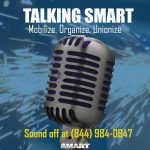
This payment(s) will not affect your qualification or eligibility for unemployment or underemployment benefits to which you may be entitled to for the 2020 A-Period and will not be counted against those benefits. The benefit, however, will count as a benefit received in determining, in the future, whether you have met the 200% rule and in determining severance and retiree HCRA benefits.
Later this week members will be able to make application via our website (www.sasmi.org). Once there, use the link labeled “COVID-19”. All questions must be answered in order to be considered for this benefit. Once submitted, SASMI will validate your qualifications for this benefit including, as appropriate, contacting your Local Union Representative or Employer.
Due to staffs limited office availability during this time and to expedite payment we will temporarily only be able to process ACH payments to a member’s bank. Benefits that need to be paid by check may be delayed.
Author: paul
Union Plus is available to help SMART members and their families through times of uncertainty with unique Hardship Help benefits. Find out if you’re eligible for these Union Plus programs.
Financial Assistance
- Strike Benefits
- Layoff Assistance
- Debt Management
- Credit Counseling
- Bankruptcy Counseling Fee Waiver
- Legal Help
Homeowner Assistance
Healthcare Assistance
SMART takes all threats to members and the general public seriously and stands ready to assist those in our communities when dealing with the coronavirus outbreak.
The U.S. Centers for Disease Control and Prevention (CDC) and the Canadian Public Health Agency (PHA) have been responding to the outbreak of the coronavirus (COVID-19), and have confirmed that the virus has infected a growing group of people in North America.
SMART members, including those working on job sites, production shops, bus and transit operators along with those work on the freight railroads, interact with the public on a daily basis and are at a heightened risk of contracting communicable diseases.
This requires that each member be vigilant, be prepared and come together.
COVID-19 symptoms are like those of influenza (Examples include fever, cough and shortness of breath), and the current outbreak is occurring during a season when respiratory illnesses from influenza and other viruses exist. Symptoms may appear in as few as two days or as long as 14 days after initial exposure. According to the Center for Disease Control (CDC), that people who are most at risk for hospitalization/ severe symptoms are either people over age 65 with weakened immune systems due to age, or those who have underlying chronic diseases such as COPD and hypertension.
SMART is monitoring the situation and will continue to communicate with members as developments progress.
Visit the SMART Emergency Legislative Alert page for updates on the impact of the legislative and regulatory response to the COVID-19 crisis on members as well as links to available government resources.
TD members: Report COVID-19 protocols not being followed
Transportation Division President Jeremy Ferguson’s statement to members regarding COVID-19.
Here are resources that can be of use:
This website provides information, guidance and links to additional resources including What You Should Know, Situation Updates and other Information. This website also has the CDC response, latest news and more. The CDC will continue to provide updated information as it becomes available, in addition to updated guidance.
CDC Resources for Managing Anxiety and Stress The outbreak of coronavirus disease 2019 (COVID-19) may be stressful for people. Fear and anxiety about a disease can be overwhelming and cause strong emotions in adults and children.
Downloadable Health and Safety Fact Sheet and Safety Manual from SMOHIT The Sheet Metal Occupational Health Institute Trust (SMOHIT) along with the International Training Institute (ITI) and National Energy Management Institute Committee (NEMIC), the three funds have created a one-sheet with guidelines for the construction industry. This also includes a complete manual with the most current information on protecting your health, as well as the health of your coworkers and family, while working in the sheet metal industry.
For TD members and retirees:
- Spring pre-retirement seminars canceled by RRB
- State Legislative Boards directed to cancel meetings, hold mail elections
- SMART-TD leaders urge action from FMCSA administrator
- Railroad Retirement Board field offices are closed until further notice.
- Social Security offices closed to public
- TD Locals may cancel March and April meetings
On February 24, the Trump Administration requested $2.5 billion from Congress in emergency funding to address the COVID-19 pandemic. At the end of the process, the bill came to $7.8 billion in emergency spending with the bulk of funding to Health and Human Services and Centers for Disease Control for state and local preparedness.
It also included Public funding to cover the cost of testing for the virus along with $300 million to make any future vaccine (when it is available) accessible to Americans regardless of an individual’s ability to pay.
A portion of the bill, added by Representative Nita Lowey (D-NY), includes $500 million is for “Medicare telehealth mandatory spending, which would allow Medicare providers to furnish telemedicine services to seniors.” Source.
The bill passed the Senate by a 96–1 vote on March 5th. The focus of the bill was on funding some of the health and emergency preparedness to combat the virus with future bills fashioned or being constructed to address the human and financial toll on American families.
The bill can be read at this link in its entirety.
Ty Dragoo: On Making A Difference By Becoming A Convention Delegate
Ty Dragoo is the Kansas State Legislative Director for SMART TD.
From roll calls and speeches to flags and ticker tape, the national conventions are usually conventional pep rallies for the two major parties. But this year, the Democratic and Republican delegates and the rules that govern their gatherings matter.
On the left, the democratic field is full of candidates.
On the right, Donald Trump is the apparent nominee in the Republican convention.
I have been a national delegate to the 2012 and 2016 Democratic conventions for the State of Kansas. I was first approached about running as a delegate when elected to the labor committee of the Kansas Democratic Party. I quickly realized that this was an excellent opportunity to advance SMART’s legislative priorities. The notion that we, as labor, could have a seat at the table was paramount.
After all, it’s the delegates at the convention — not the voters back home — who have the last word on the nominees.
Any time there’s a closely contested nomination, it does come as a surprise to primary voters that the delegates are the ones who ultimately make the decision. That is why we need as many people in the labor movement involved in this process as possible.
How exactly the delegates do this is complicated. Here are the answers to some questions you may have had about the nominating process.
What is a delegate?
Delegates are the individuals who vote for their party’s presidential nominees at this summer’s conventions. The 2020 Democratic National Convention will be held from July 13th to 16th, 2020, at the Fiserv Forum in Milwaukee, Wisconsin.
Since by tradition, the convention of the party currently holding the White House is held after that of the opposing party, the 2020 Republican National Convention will be held on August 24th to 27th, 2020, at the Spectrum Center in Charlotte, North Carolina.
Who gets to be a delegate?
Most delegates are grassroots party activists who campaign to represent their congressional district or their state at large. But both parties also set aside a certain number of delegate slots for “party insiders.”
On the GOP side, these are each state’s party chair and two Republican National Committee members. The committee members — 112 in all — also make the rules that govern the national convention.
Under the Democratic Party’s system, about one-sixth of the delegates are party officials, members of the DNC, all the Democrats in Congress, all Democratic governors, and distinguished party leaders (such as all former and current presidents and vice presidents). Unlike the Republican party leaders, these 700 or so Democratic superdelegates aren’t bound to primary results and can vote for whomever they wish after the first round of balloting.
How do you become a delegate?
The rules for delegate selection are complex, varying not only by party but by state, by year, and even by congressional districts.
Most states stipulate that elected delegates should be reflective of primary results. The best place to start is to ask your State Legislative Director or State party.
Just how committed are the delegates?
All Democratic delegates, except the superdelegates, are pledged to vote at the convention for their state’s or district’s winner. On the whole, the GOP delegates are also supposed to reflect the will of their state’s voters, but the rules give them some leeway.
Why is it important as a union member to become a delegate?
Here are a few of the reasons SMART wants YOU to serve as a delegate at the national conventions.
Working Americans;
The parties need our economic class. States strive to reflect their diversity in the makeup of their delegations. SMART’s membership is comprised of good-paying middle-class jobs, making union members a natural fit.
Policy;
It’s a powerful way to shape labor policy. Members’ voices deserve to be heard. As a delegate, you’ll help draft the party platform, including making labor a central issue in the upcoming election.
Next President;
You could end up picking the party’s nominee. If nobody wins in the first ballot, delegates are free to shift their votes to the (pro-labor) candidate of their choice.
It’s Interesting;
Getting to see democracy in action, up close, as a party VIP, is a once-in-a-lifetime experience for most of us.
SMART Sheet Metal Local 276 in Victoria, BC has been working with a local organization called Hero Work. Hero Work brings together companies and workers to perform “Radical Renovations” on buildings that house charities.
Most local charities devote all their finances and efforts to provide for those less fortunate and quite often are in less than desirable buildings that require upgrades. Hero work has completed more than two million dollars in renovations on charity buildings since 2011. This project for PEERS, who help marginalized workers in the sex industry, was Local 276’s second project with Hero Work.
Lewis Sheet Metal provided all the fans, duct and fittings and Associated Sheet Metal provided the stainless steel for back splash in the kitchen.
Local 276 Business Manager Jason Pedersen noted that “this type of work is something members enjoy doing as we show our value to our local communities and build alliances that keep us central to what happens locally. I am proud of our Local’s work in the Victoria community and look forward to the partnerships we will continue to build into the future.”

There is also an Open Mic segment where the General President fields questions from members about women in the sheet metal industry, the upcoming election, and rail safety.
Members are encouraged to submit their questions and comments to 844-984-0947.
The inaugural episode of the Talking SMART podcast looked at a proposal from Senate Republicans that posed a serious threat to our union retirement security. Presented in a white paper by Senator Chuck Grassley (R-Iowa), this plan would have imposed a new 10% tax on retirees and punished healthy plans with an 11-fold jump in fees.
SMART General President Joseph Sellers was the featured guest for episode one; he discussed this dangerous proposal, as well as the overall state of union retirement security in America.
“This affects the plan participant, the working member, our families, our spouses, our children … healthy plans, retirees, active members didn’t create this problem, and it shouldn’t be on their back,” Sellers said during the episode.
Since this episode, enormous developments have taken place. Pro-labor elected officials passed the American Rescue Plan in 2021, which included multiemployer pension relief. Funding from this legislation has already saved more than 550,000 pensions nationwide – including 1,600 SMART members in the Sheet Metal Workers Pension Fund based in Massillon, Ohio – with millions more eligible.
And effective January 1, 2022, the Sheet Metal Workers’ National Pension Fund is 81.5% funded and has been certified in the Green Zone following decades of recovery. This means that SMART sheet metal workers and retirees can rest assured that their pensions are strong and healthy, giving them greater peace of mind that they can count on the National Pension Fund (NPF) in retirement.
Related Resources:
- SM National Pension Fund
This web site features a whiteboard primer on pension and retirement plans available through the SM National Pension Fund, as well as information on defined benefit and defined contribution plans. The whiteboard primer may also be viewed on YouTube. - Senate Republicans’ Pension White Paper
View the full multiemployer pension white paper drafted by Senate Republicans and released in November 2019.
Return to Talking SMART index page.
Talking SMART is a member of the Labor Radio Podcast Network — working people’s voices, broadcasting worldwide 24 hours a day.

Under that plan, which went into effect for tax year 2018, one key change was the elimination of nearly all formerly allowable deductions for unreimbursed employee expenses. That means, among other things, that construction, railroad, production or transit workers can no longer itemize and deduct any of the following unreimbursed work-related expenses:
• Safety gear
• Clothing required for work, including steel-toed boots
• Mileage driving from one worksite to another (including
out-of-town locations)
• Mileage driving to buy tools or materials for a job
• Hotel stays during employer-required re-locations or
out-of-town assignments
• Meals during employer-required re-locations or
out-of-town re-assignments
The new tax laws also eliminated deductions for state and local taxes, but nearly doubled the standard deduction. Whether those changes result overall in tax cuts or tax breaks for SMART members depends on individual tax situations, which vary greatly.
How have these and other tax changes affected you and your family? Did the elimination of deductions for unreimbursed employee expenses impact you? Did you pay more or less in 2018? If you had a refund, was it bigger or smaller? What do you anticipate for your 2019 taxes?
Let us know at members@smart-union.org or visit this link: https://www.facebook.com/smartunion/photos/a.383672653313/10156780325048314/?type=3&theater
 Brothers and sisters,
Brothers and sisters,
